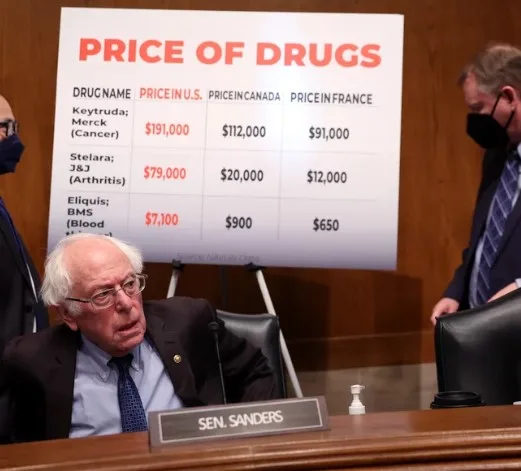Why do some drugs cost ten times more in the U.S. as in other countries, senators ask
By Sydney Lupkin
Sparks flew on Capitol Hill Thursday as the CEOs of three drug companies faced questions from the Senate Committee on Health, Education, Labor and Pensions about why drug prices are so much higher in the United States than they are in the rest of the world.

U.S. Senator Bernie Sanders asks the CEOs of major pharmaceutical companies why medicine costs more in the U.S. as in other countries.
The executives from Bristol Myers Squibb, Johnson & Johnson and Merck spent almost three hours in front of the committee going back and forth about pricing practices and how the companies spend their money.
“We are all aware of the many important lifesaving drugs that your companies have produced,” said a noticeably subdued Sen. Bernie Sanders, Vermont Independent and the committee chairman. “That is extraordinarily important. But as all of you know, those drugs do nothing for anybody who cannot afford it.”
Merck’s cancer drug Keytruda costs $100,000 more in the U.S. than it does in France, according to a committee analysis. Bristol Myers Squibb’s blood thinner Eliquis costs almost 10 times more in the U.S. than in Germany. Johnson & Johnson’s arthritis drug Stelara costs five times more in the U.S. than it does in Japan.
The executives made familiar arguments that the U.S. pays more for drugs but also gets new drugs faster. The drugmakers also said that middlemen called pharmaceutical benefit managers, or PBMs, take a big share of the list prices for themselves.
“Their negotiating strength has increased dramatically,” Merck CEO Robert Davis said. “In contracting with them, Merck continues to experience increasing pressure to provide even larger discounts. And the gap between list and net price continues to grow, and patients are not benefiting from the steep discounts we provide.”
However, the legislators were prepared and often shot back, for instance, that while drugs take longer to get on the market in Japan and Canada, for instance, that hasn’t hurt those countries’ life expectancies. In fact, people in Japan and Canada live longer, on average, than they do in the United States.
Sanders asked Merck’s Davis if he had ever searched GoFundMe to see if anyone was trying to raise money to pay for Keytruda. He said he hadn’t. Sanders said his staff had.
“We have found over 500 stories of people trying to raise funds to pay for their cancer treatments,” he said. “And one of those stories is a woman named Rebecca, the school lunch lady from Nebraska with two kids who died of cancer after setting up a GoFundMe page because she could not afford to pay for Keytruda. Rebecca had raised $4,000 on her GoFundMe page, but said the cost of Keytruda in a cancer treatment was $25,000 for an infusion every three weeks.”
The CEOs of Merck and Johnson & Johnson initially declined to testify. Sanders said they told his staff they didn’t have the expertise to talk about drug pricing.
“Merck went so far as to tell our staff that their CEO is a tax attorney who is not an expert on prescription drug prices,” Sanders told reporters on Jan. 25, calling the reasons companies offered for declining to testify “laughable to absurd.”
The committee was about to vote on subpoenaing the CEOs when they agreed to testify voluntarily.
The trade group PhRMA, which stands for Pharmaceutical Research and Manufacturers of America, emailed a preemptive statement Wednesday that said comparing drug prices in the U.S. to those abroad doesn’t tell the whole story. The trade group said that new medicines launch earlier in the U.S. than in the rest of the world, giving Americans faster access. It also pointed the finger at other high health care spending and PBMs.
“Allowing foreign governments to influence U.S. prices won’t fix America’s health care system,” PhRMA wrote.
Early last week, the HELP Committee released a report that found Bristol Myers Squibb, Johnson & Johnson and Merck spend more on executive compensation, stock buybacks and dividends than they do on research and development.
“In other words, these companies are spending more to enrich their own stockholders and CEOs than they are in finding new cures and new treatments,” Sanders reiterated in his opening statement at the hearing. “Now, the average American who hears all this is asking a very simple question. How does all of this happen? ”
The report showed that these companies make more money selling their popular drugs in the U.S. than selling them in the rest of the world combined. The report also found that while some drug prices climb in the U.S., they go down or stay the same elsewhere.
_________________
Credit: NPR





















